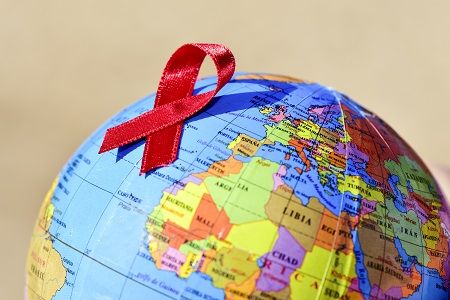How Long Will HIV Viral Suppression Last?
The rates of viral rebound in people with long-term viral suppression on first-line regimens have become "extremely low," according to a study.

Long-term treatment with antiretroviral therapy (ART) may really be a reprieve from a death sentence for many people diagnosed with HIV, according to a new British study.
“These results suggest that many people on ART will not have viral rebound over their lifetime,” author Andrew Phillips, PhD, a [rofessor of epidemiology and biostatistics at the University College London, wrote.
The rates of viral rebound in people with long-term viral suppression on first-line regimens have become "extremely low," according to the study.
The study noted that most HIV patients who start on ART now achieve viral suppression within 3 to 6 months. The findings showed that, for those who are adherent to a first-line medication regimen started after 2008, the rebound rate is not only low but declines over at least 7 years before stabilizing at a low level — "as low as 1% per year in some demographic groups."
The 1% rate took into account that many viral rebounds are temporary, which the study defined as a single measurement of 200 copies per milliliter, followed up by a later measurement of 50 copies per milliliter or less.
Higher rates of viral rebound were found among black African men (about 1.88%) and women (about 1.65%) and among those with higher viral loads (about 1.04%) and higher CD4 counts (about 1.04%) before initiating ART. The study speculated that the reasons for increased risks for black African men and women might relate to "socioeconomic conditions or inconsistent prioritization of ART adherence over other challenges of daily life.”
The authors were uncertain about the cause of the higher rates among those with higher initial viral loads and CD4 counts.
The groups with the lowest rates of risk for viral rebound were older and started ART at a more recent date. Older age is associated with better mediction adherence, accoridng to the study. Starting ART more recently might reduce the risk because newer medications are less toxic and more effective and easier for patients to tolerate and manage.
The study offered several potential explanations for the decreasing rates of viral rebound, which included that over time people integrate taking anti-retroviral drugs into their daily routine and the possibility that “viral suppression can be maintained with decreasing adherence over time.”
The causes of viral rebound after years of suppression are unknown, but researchers noted they had found no evidence "for a limit of durability of ART efficacy.”
The study was based on a test population of 16,101 drawn from The UK Collaborative HIV Cohort (UK CHIC) which provided data from people with HIV who were seen at least once at 21 clinics from throughout the United Kingdom.
Participants were included in the study if they were 16 or older, started ART with a regimen of at least 3 anti-retroviral drugs for the first time between January 1, 1998 and May 31, 2013, and had at least 9 months of follow-up after initiating ART. The median number of viral load measurements per patient was 7.
Limitations regarding its findings included the inability to extrapolate the results to people who do not have an initial positive virological suppression with ART or who are receiving second or more lines of ART, according to the study. It also did not take into account factors that could affect adherence such as socio-economic status, drug and alcohol use, mental health status or incarceration.
Nonetheless, with the number of people on ART worldwide approaching 20 million, the study said its findings are “of public significance worldwide.”
The study, "Long-term durability of HIV viral load suppression," was published online in the journal The Lancet.
Related Coverage
Lesbian, Gay, Bisexual Adults Report Greater HIV Test Rates, Worse Health
One-third of Low Viral Load HIV Patients Avoid Treatment
Opioid Threat Grows to National Emergency, Study Shows Mortality Rates Are Even Worse
2 Commerce Drive
Cranbury, NJ 08512
All rights reserved.